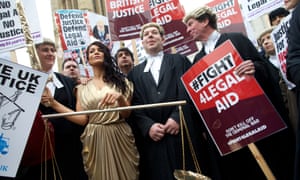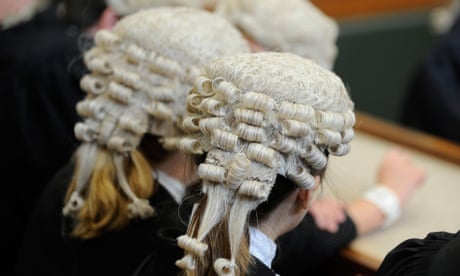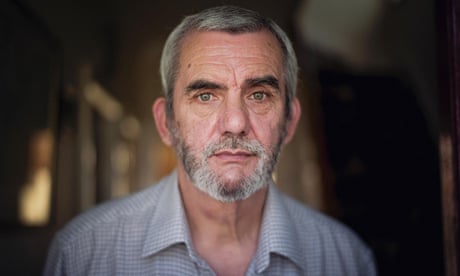The media jump on high-profile cases of criminals like Ben Butler and Jennie Gray receiving huge amounts in legal aid. The real outrage is successive governments’ policy to limit access to it

‘Even if we have done something wrong, or criminal, or stupid, we should still have someone who understands the law fighting on our behalf.’ Photograph: Andrew Cowie/AFP/Getty Images
It is with a mixture of intense frustration and sadness that I read the reports about the amount of legal aid that Ben Butler, convicted of murdering his six-year-old daughter, and his partner Jennie Gray, guilty of child cruelty, received. The figure is quoted at approximately £1.5m over a 15-year period, with £1.2m in civil legal aid.
It is with a mixture of intense frustration and sadness that I read the reports about the amount of legal aid that Ben Butler, convicted of murdering his six-year-old daughter, and his partner Jennie Gray, guilty of child cruelty, received. The figure is quoted at approximately £1.5m over a 15-year period, with £1.2m in civil legal aid.

Legal aid cuts have led to surge in DIY defence, says charity
It’s frustrating for a number of reasons. Of the £1.5m, approximately £300,000 went towards legal aid for criminal proceedings, and accounted for a month-long trial involving complex medical evidence for an original child cruelty and GBH trial, Gray’s case involving perverting the course of justice, and Butler’s murder trial. One would hope that in all of these cases, the legal aid lawyers were working to the best of their ability using the highest quality lawyers willing to conduct work at legal aid rates.
What is also true, is that the lawyers involved will have undertaken an immense amount of work that they weren’t paid for. Had they been privately funded, the fees would have been many multiples higher.
As a criminal practitioner of more than 20 years, I know the workloads that are undertaken daily by legal aid lawyers. In London, the going yearly salary for a duty solicitor is about £30,000 but may reach £40,000 with experience. Barristers’ chambers are paid £50 for sending a barrister to a hearing. This covers travelling time, the two hours waiting to get into court and the actual time spent representing a client in court – and the barristers will only get a cut of that money.
If you attend the police station, the firm is paid £150-£250 per case, which includes the initial attendance, plus any further bails to return to the station on other days – which might include ID parades or second or third interviews. Those who freelance at the police station are paid less than £100 per visit, which can mean a couple of hours travelling as well as up to 12 hours of waiting and advising. Police station advisers’ fees therefore range from an hourly rate of £30 down to £7 – it doesn’t vary with bank holidays or the fact that most of this advising occurs at ungodly hours of the night or weekends.
Legal aid solicitors have similar qualification periods to doctors: after completing a first degree they undergo a year of practical qualifications, then two years of on-the-job training. The qualification for barristers is a year shorter – but the cost of this in London has been estimated by the Bar Council as more than £120,000. Graduate salaries in legal aid firms are usually at the Law Society’s minimum of £18,590 pa for London. Of the respondents surveyed by Young Legal Aid Lawyers(whose membership consists of those within 10 years of qualification), 50% had salaries under £20,000 in 2013.
A well-known London plumbing firm is delighted to share its call-out rates with the public – they are “100% transparent charges and we have a clear, upfront, open and honest pricing system”. These charges range from a weekday daytime rate of £95 per hour at a minimum of one-hour call-out and 15 minute increments after this, to a 12am-7am rate of £200 per hour. Trust me – legal aid firms would kill for these rates.
Legal aid is a national institution, like the NHS. We all hope that we will never need it, that we won’t have unfounded rumours triggering a social services investigation or family proceedings; that we won’t be falsely accused of a crime. Even if we have done something wrong, or criminal or stupid, we should still have someone who understands the law fighting on our behalf to put our side of the story and explain our circumstances. This is part of what has separated us as a “civilised society”, these rights and freedoms and the privilege to be served by those who choose to sacrifice massive incomes to do relatively poorly paid legal aid work.
The unfortunate thing is that it is the abnormal cases like this (which are often the only things that allow a legal aid practice to survive the otherwise dreadful legal aid rates), and the abnormal earnings of barristers with huge experience dealing with the most serious cases and working insane hours, that get reported. Legal aid is not a vote winner; it doesn’t fall into the category of being tough on crime, and it always seems to be paid to people we like to blame – immigrants, good-for-nothings, so-called scroungers. It’s just your money being spent on someone else.
The difficulty comes when that someone else is you. Teacher, doctor, police officer, journalist, city trader, engineer, labourer, English, Scottish, white, black, depressed, addicted, sober: I have represented all of you, without judgment, to the best of my abilities, 24 hours a day for over 20 years.

Ellie Butler's grandfather: 'The devastation is complete and utter'
re
What makes me sad is this. Ellie Butler’s grandparents were not entitled to legal aid. Despite spending their life savings and working extra jobs, they could not fight for custody of their grandchild, whom they were concerned may be at risk. They couldn’t afford to pay their private legal fees and had to represent themselves and lost. This is the tragedy: not that £1.5m went on legal aid, but that Neal and Linda Gray didn’t get any help to fight for their granddaughter.
No comments:
Post a Comment